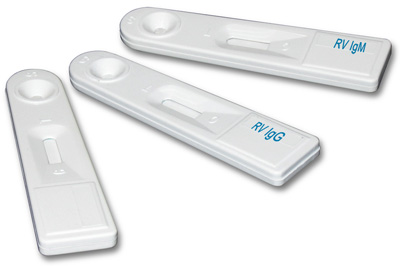Rubella IgM and IgG Test Kits
Both one-step lateral flow rapid test kit and dot filtration assay kit are available for the detection of Rubella IgG and IgM antibody isotypes, which are used in diagnosis of rubella virus infection.

Intended Use
Atlas Link Technology Co., Ltd supplies both lateral flow rapid test and dot filtration test kit for the detection of rubella IgG and IgM antibodies, and are used in the diagnosis of rubella virus infection.
Rubella DOT filtration assay kits and Rubella Lateral Flow rapid test kits are easy to perform and no need of other instrument, so as they sometimes are regarded as point-of-care (POCT) test kits. All these Rubella POCT test kits are based on the principle of Gold Immuno-chromatography Assay (GICA). Specific rubella recombinant antigens and anti-human monoclonal antibodies are used to detect rubella IgM and IgG antibodies respectively in the human serum samples with high sensitivity and specificity.
Application of Rubella Test Kits
Rubella IgM antibody usually present along with, or shortly after, the characteristic rash appear, and persist several weeks; the determination of rubella IgM antibody is particularly useful for diagnosis of recent infection. While rubella IgG antibody usually persists more than a year, and usually life long for adult. Screening for rubella IgG antibodies is a useful method for the determination of the immune status. So, the combined determination of rubella IgM and IgG antibodies is particularly useful for the effective distinction between recent infection or vaccination and acquired immunity.
Rubella
Rubella virus is a member of the Togaviridae family. Although rubella can strike people of all ages, it poses the greatest danger to unborn babies. Congenital rubella syndrome (CRS) occurs when the rubella virus attacks a developing fetus. Up to 85% of infants infected during the first trimester will be born with birth defects, including deafness, blindness, heart defects, and mental retardation. Miscarriages are also common. Growth retardation and diabetes mellitus have also been associated with late complications of congenital rubella.

 Atlas Link Technology Co., Ltd
Atlas Link Technology Co., Ltd